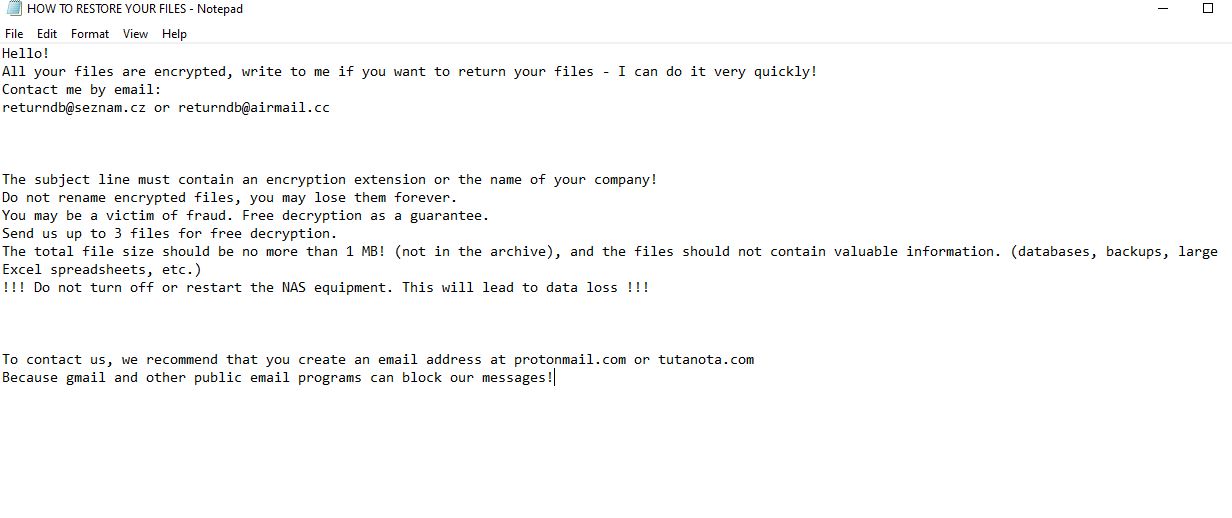Read this article to learn how to remove ijikpvj ransomware and how to possibly recover files.
ijikpvj Ransomware
ijikpvj is the name of a ransomware virus that has been spotted in the wild. This cryptovirus is developed to corrupt computer operating systems and lock personal files. It lands on computer systems without being noticed. The encryption of personal files is followed by the creation of a ransom note called HOW TO RESTORE YOUR FILES.txt. This file aims to convince victims to contact hackers at one of the presented email addresses and ask for further details on ransom payment. Since .ijikpvj files remain inaccessible until their code is reverted back to the normal state, many users rush into paying the demanded ransom. However, even the successful completion of this step provides no guarantee that .ijikpvj files will be decrypted by the specialized decryption tool.
Read this article to learn how to get rid of malicious files installed by ijikpvj ransomware and how to potentially restore files without paying the ransom.

ijikpvj virus Summary
| Name | ijikpvj |
| File Extension | .ijikpvj |
| Type | Ransomware, Cryptovirus |
| Ransom Notes | HOW TO RESTORE YOUR FILES.txt |
| What is It? | A ransomware that encodes your important files and asks you to pay a ransom to recover them. |
| Symptoms | All .ijikpvj files cannot be opened due to changes applied to their code. You are asked to contact hackers and pay a ransom for a data decryption tool. |
| Distribution Method | Spam Emails, Email Attachments, Executable Files, Hacked Websites |
| Removal | To effectively remove active ijikpvj virus virus infections, we recommend that you use an advanced anti-malware tool. Download
Malware Removal Tool
|
User Experience | Join Our Forum to Discuss ijikpvj virus. |
| Data Recovery Tool | Windows Data Recovery by Stellar Phoenix Notice! This product scans your drive sectors to recover lost files and it may not recover 100% of the encrypted files, but only few of them, depending on the situation and whether or not you have reformatted your drive. |
More Information About the ijikpvj Ransomware Virus
The ijikpvj virus, alternatively called the .ijikpvj ransomware as related to the extension bestowed on the victim files. It is distributed via the same infection strategies as other similar threats. At this time we do not have information regarding the hacking group behind it, as well as any code similarities between this and other malware. There are only a few samples collected at this time and no detailed is available at this time.
Viruses like this one are typically pushed through individual attack campaigns focusing on one or several methods. The ransomware is usually made part of other files leading to the so-called payload delivery mechanism. The hackers insert the relevant virus code in data that are typically downloaded and run from the Internet. Carriers can be macro-infected documents of all popular office formats: spreadsheets, text documents, databases and presentations. When opened they will ask for the built-in scripts to be run, if this is done they will run the malware setup on the local hosts automatically. A similar strategy is to create software setup bundles of well-known programs. The hackers typically make them by downloading the legitimate and original files and adding in the necessary code.
All of the virus-related files may be “pushed” to the target end-users using phishing strategies, they are the imitation of well-known services and companies and their assets. As such the virus carriers can be email messages (in the form of notifications, contracts, and other commonly received data) or the hosting of such sites. They can impersonate portals and pages that are hosted on similar-sounding domain names, they can even integrate self-signed security certificates. All virus data related to the ijikpvj Virus may be uploaded to online communities and file-sharing networks. Fake or stolen identities can be utilized to manipulate users into downloading and running them.
The ijikpvj virus will start its built-in execution sequence as soon as it is placed on a given network. While we do not have an extensive analyisis, it is very likely that they will launch an extensive sequence that is made up of all the smaller modules and hacking instructions embedded in the main virus. From our overview of file encrypting viruses we can state that it is very possible for information gathering to take place. Such actions include the collection of personal users information, hardware components data and other related information. It can be used to count the number of infected devices, or alternatively, to lead to other crimes such as identity or financial abuse.
The ijikpvj virus can be used to change important settings on the victim computers. This includes the setting up of the threat as a persistent infection, making it automatically start once the computer is powered on. It may also block access to the recovery options which makes recovery much more difficult. A lot of viruses of this category may also delete important files including backups, shadow volume copies and application data. If Windows Registry values are changed, this may lead to unexpected errors, data loss, and severe performance issues.
The ijikpvj ransomware can be used as a virus installer for other popular malware categories. One of the most popular tactics is to deploy Trojan horse clients to the compromised computers. This will allow the criminals to take over control of the victim systems, steal any files, and spy on the victims.
An important part of ransomware infections is that advanced versions may call another function called security bypass that will override programs and operating system services that guard against malware. This works for anti-virus programs, firewalls, intrusion detection systems and etc. They can be disabled or entirely removed, depending on the hacker instructions.
When everything has finished running the actual files manipulation and processing will start. The data to be encrypted will be based on а built-in list of target files: they are commonly documents, multimedia files, archives, backups and etc. All of them will be processed by a strong cipher and renamed with the relevant .ijikpvj extension. The victims will then be blackmailed to pay the criminals a decryption fee through the generated text files and lockscreen instances.

Remove ijikpvj Virus – Try Restoring Files
In order to Remove ijikpvj ransomware, we strongly recommend that you read the instructions in this article. Experts suggest that the best way towards fully erasing ijikpvj Virus is to follow the removal steps that are underneath in combination with downloading an advanced malware removal tool. Such software will scan your computer for any malware and make sure that it’s fully gone from it.
- Step 1
- Step 2
- Step 3
- Step 4
- Step 5
Step 1: Scan for ijikpvj virus with SpyHunter Anti-Malware Tool
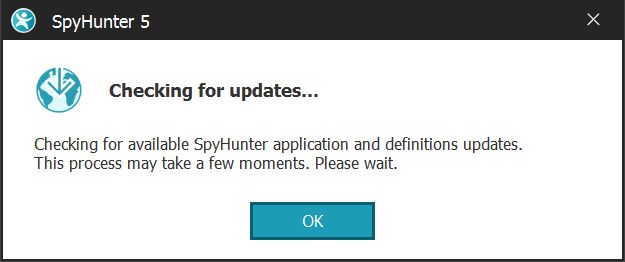
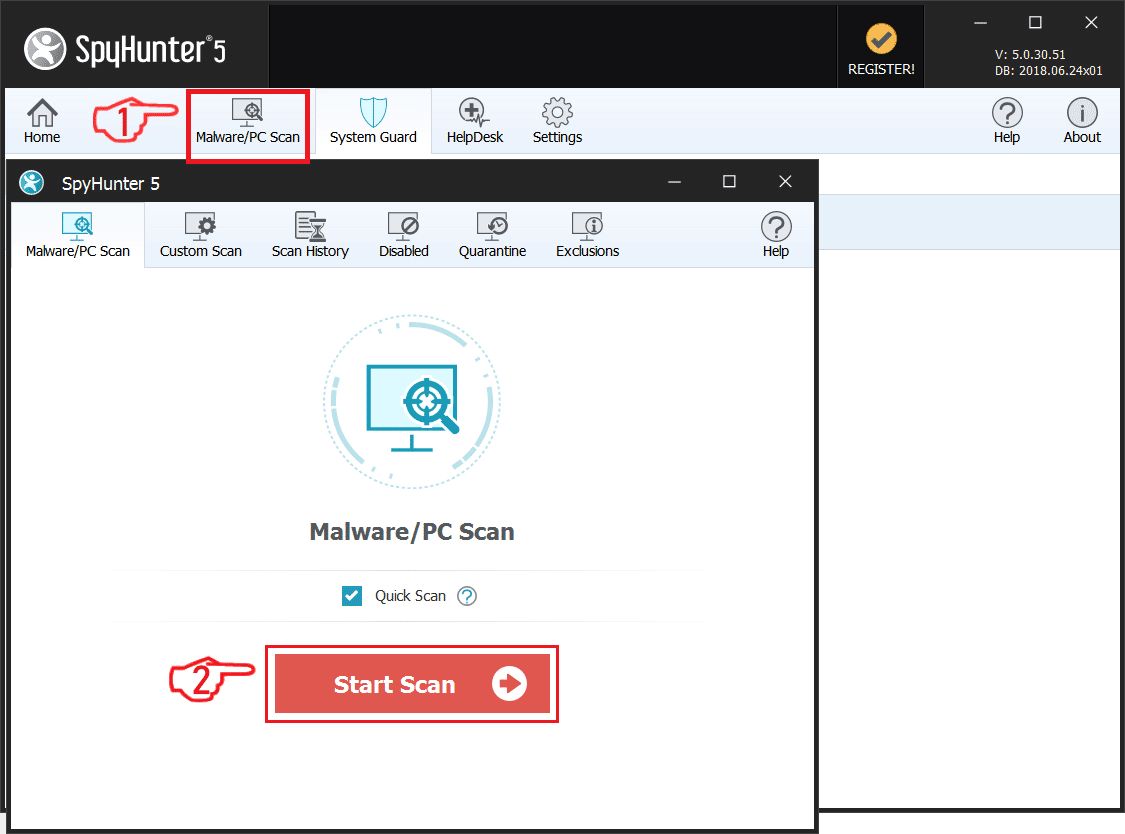
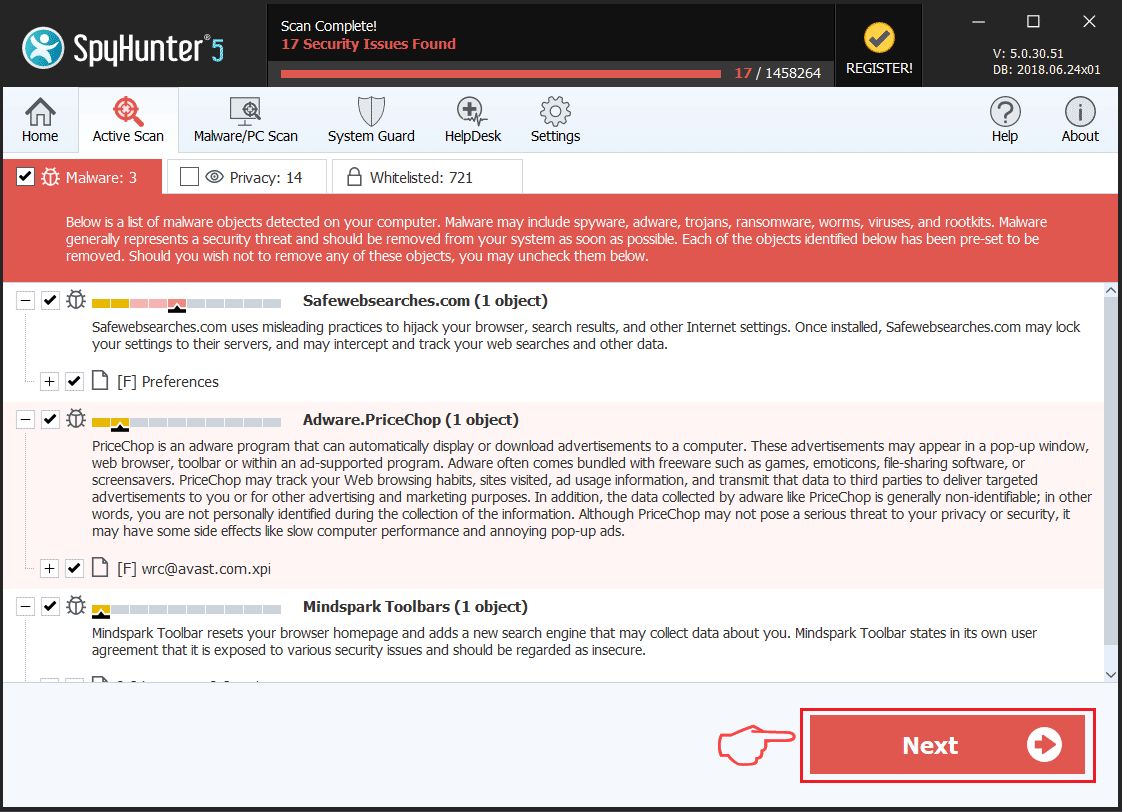
Ransomware Automatic Removal - Video Guide
Step 2: Uninstall ijikpvj virus and related malware from Windows
Here is a method in few easy steps that should be able to uninstall most programs. No matter if you are using Windows 10, 8, 7, Vista or XP, those steps will get the job done. Dragging the program or its folder to the recycle bin can be a very bad decision. If you do that, bits and pieces of the program are left behind, and that can lead to unstable work of your PC, errors with the file type associations and other unpleasant activities. The proper way to get a program off your computer is to Uninstall it. To do that:

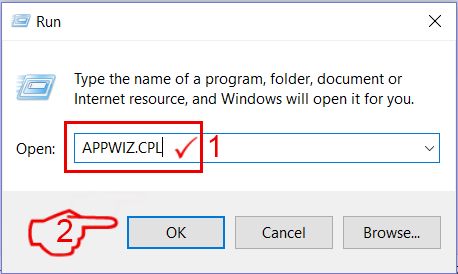
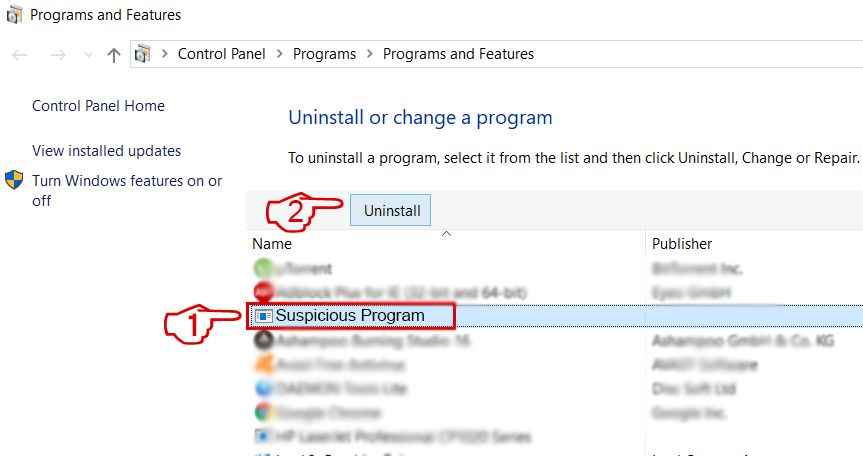 Follow the instructions above and you will successfully delete most unwanted and malicious programs.
Follow the instructions above and you will successfully delete most unwanted and malicious programs.
Step 3: Clean any registries, created by ijikpvj virus on your computer.
The usually targeted registries of Windows machines are the following:
- HKEY_LOCAL_MACHINE\Software\Microsoft\Windows\CurrentVersion\Run
- HKEY_CURRENT_USER\Software\Microsoft\Windows\CurrentVersion\Run
- HKEY_LOCAL_MACHINE\Software\Microsoft\Windows\CurrentVersion\RunOnce
- HKEY_CURRENT_USER\Software\Microsoft\Windows\CurrentVersion\RunOnce
You can access them by opening the Windows registry editor and deleting any values, created by ijikpvj virus there. This can happen by following the steps underneath:
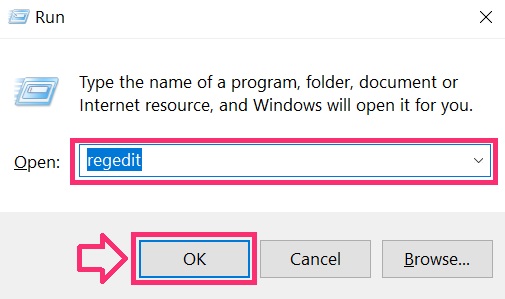

 Tip: To find a virus-created value, you can right-click on it and click "Modify" to see which file it is set to run. If this is the virus file location, remove the value.
Tip: To find a virus-created value, you can right-click on it and click "Modify" to see which file it is set to run. If this is the virus file location, remove the value.
Before starting "Step 4", please boot back into Normal mode, in case you are currently in Safe Mode.
This will enable you to install and use SpyHunter 5 successfully.
Step 4: Boot Your PC In Safe Mode to isolate and remove ijikpvj virus

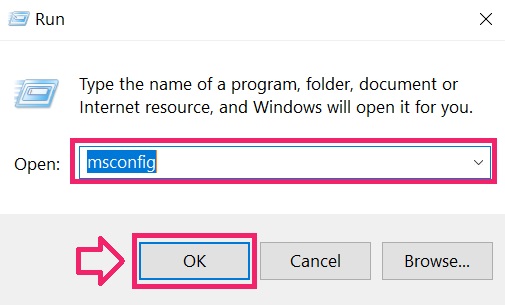
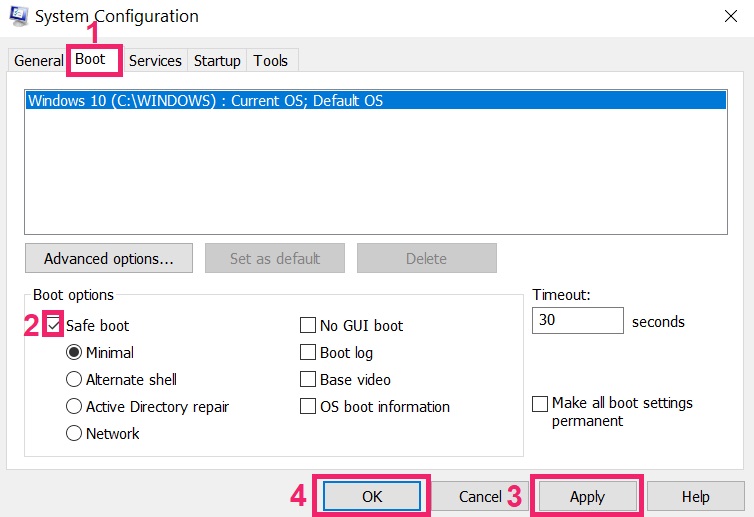
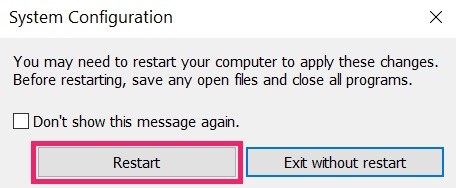
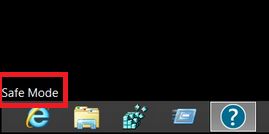
Step 5: Try to Restore Files Encrypted by ijikpvj virus.
Method 1: Use STOP Decrypter by Emsisoft.
Not all variants of this ransomware can be decrypted for free, but we have added the decryptor used by researchers that is often updated with the variants which become eventually decrypted. You can try and decrypt your files using the instructions below, but if they do not work, then unfortunately your variant of the ransomware virus is not decryptable.
Follow the instructions below to use the Emsisoft decrypter and decrypt your files for free. You can download the Emsisoft decryption tool linked here and then follow the steps provided below:
1 Right-click on the decrypter and click on Run as Administrator as shown below:
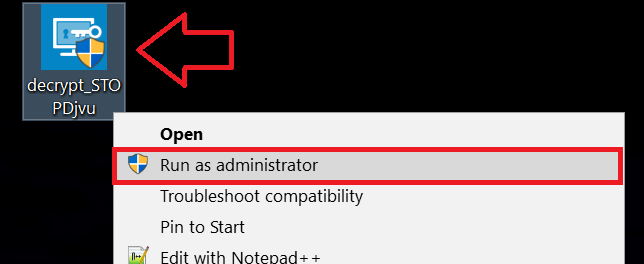
2. Agree with the license terms:
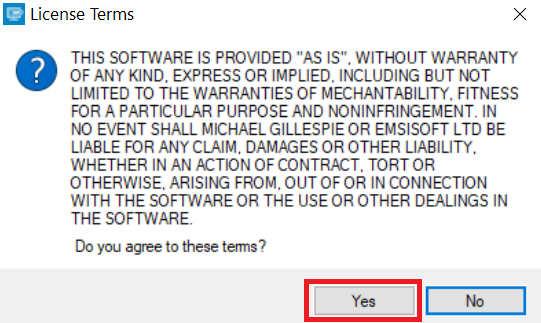
3. Click on "Add Folder" and then add the folders where you want files decrypted as shown underneath:
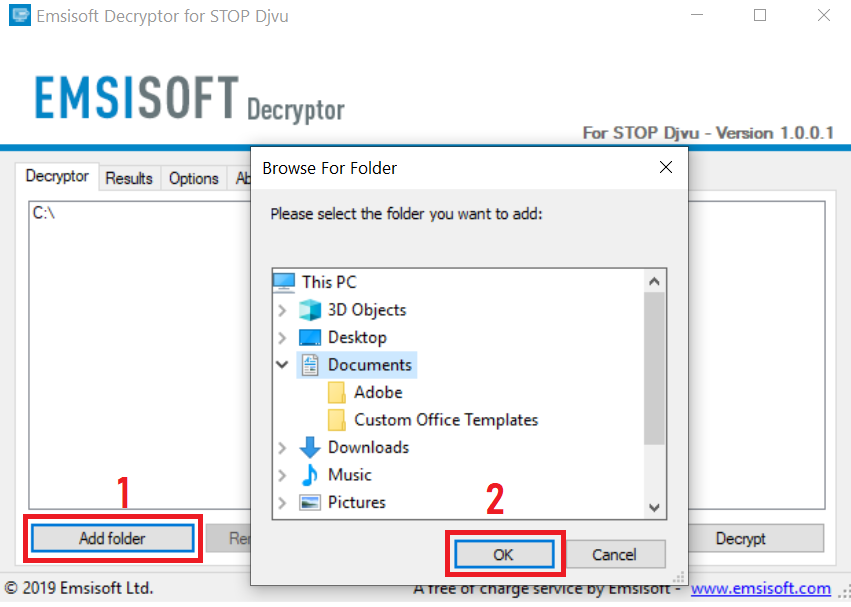
4. Click on "Decrypt" and wait for your files to be decoded.
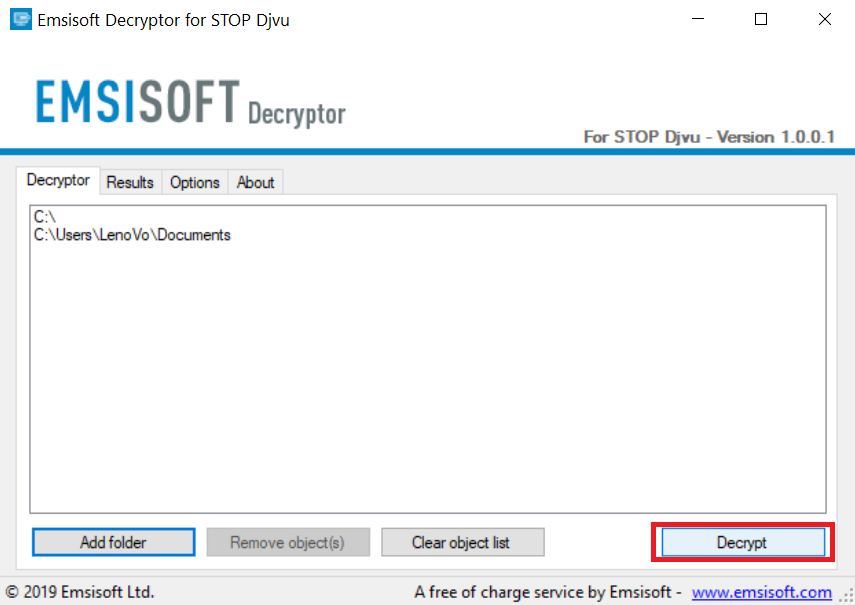
Note: Credit for the decryptor goes to Emsisoft researchers who have made the breakthrough with this virus.
Method 2: Use data recovery software
Ransomware infections and ijikpvj virus aim to encrypt your files using an encryption algorithm which may be very difficult to decrypt. This is why we have suggested a data recovery method that may help you go around direct decryption and try to restore your files. Bear in mind that this method may not be 100% effective but may also help you a little or a lot in different situations.
Simply click on the link and on the website menus on the top, choose Data Recovery - Data Recovery Wizard for Windows or Mac (depending on your OS), and then download and run the tool.
ijikpvj virus-FAQ
What is ijikpvj virus Ransomware?
ijikpvj virus is a ransomware infection - the malicious software that enters your computer silently and blocks either access to the computer itself or encrypt your files.
Many ransomware viruses use sophisticated encryption algorithms to make your files inaccessible. The goal of ransomware infections is to demand that you pay a ransom payment to get access to your files back.
What Does ijikpvj virus Ransomware Do?
Ransomware in general is a malicious software that is designed to block access to your computer or files until a ransom is paid.
Ransomware viruses can also damage your system, corrupt data and delete files, resulting in the permanent loss of important files.
How Does ijikpvj virus Infect?
Via several ways.ijikpvj virus Ransomware infects computers by being sent via phishing emails, containing virus attachment. This attachment is usually masked as an important document, like an invoice, bank document or even a plane ticket and it looks very convincing to users.
Another way you may become a victim of ijikpvj virus is if you download a fake installer, crack or patch from a low reputation website or if you click on a virus link. Many users report getting a ransomware infection by downloading torrents.
How to Open .ijikpvj virus files?
You can't without a decryptor. At this point, the .ijikpvj virus files are encrypted. You can only open them once they are decrypted using a specific decryption key for the particular algorithm.
What to Do If a Decryptor Does Not Work?
Do not panic, and backup the files. If a decryptor did not decrypt your .ijikpvj virus files successfully, then do not despair, because this virus is still new.
Can I Restore ".ijikpvj virus" Files?
Yes, sometimes files can be restored. We have suggested several file recovery methods that could work if you want to restore .ijikpvj virus files.
These methods are in no way 100% guaranteed that you will be able to get your files back. But if you have a backup, your chances of success are much greater.
How To Get Rid of ijikpvj virus Virus?
The safest way and the most efficient one for the removal of this ransomware infection is the use a professional anti-malware program.
It will scan for and locate ijikpvj virus ransomware and then remove it without causing any additional harm to your important .ijikpvj virus files.
Can I Report Ransomware to Authorities?
In case your computer got infected with a ransomware infection, you can report it to the local Police departments. It can help authorities worldwide track and determine the perpetrators behind the virus that has infected your computer.
Below, we have prepared a list with government websites, where you can file a report in case you are a victim of a cybercrime:
Cyber-security authorities, responsible for handling ransomware attack reports in different regions all over the world:
Germany - Offizielles Portal der deutschen Polizei
United States - IC3 Internet Crime Complaint Centre
United Kingdom - Action Fraud Police
France - Ministère de l'Intérieur
Italy - Polizia Di Stato
Spain - Policía Nacional
Netherlands - Politie
Poland - Policja
Portugal - Polícia Judiciária
Greece - Cyber Crime Unit (Hellenic Police)
India - Mumbai Police - CyberCrime Investigation Cell
Australia - Australian High Tech Crime Center
Reports may be responded to in different timeframes, depending on your local authorities.
Can You Stop Ransomware from Encrypting Your Files?
Yes, you can prevent ransomware. The best way to do this is to ensure your computer system is updated with the latest security patches, use a reputable anti-malware program and firewall, backup your important files frequently, and avoid clicking on malicious links or downloading unknown files.
Can ijikpvj virus Ransomware Steal Your Data?
Yes, in most cases ransomware will steal your information. It is a form of malware that steals data from a user's computer, encrypts it, and then demands a ransom in order to decrypt it.
In many cases, the malware authors or attackers will threaten to delete the data or publish it online unless the ransom is paid.
Can Ransomware Infect WiFi?
Yes, ransomware can infect WiFi networks, as malicious actors can use it to gain control of the network, steal confidential data, and lock out users. If a ransomware attack is successful, it could lead to a loss of service and/or data, and in some cases, financial losses.
Should I Pay Ransomware?
No, you should not pay ransomware extortionists. Paying them only encourages criminals and does not guarantee that the files or data will be restored. The better approach is to have a secure backup of important data and be vigilant about security in the first place.
What Happens If I Don't Pay Ransom?
If you don't pay the ransom, the hackers may still have access to your computer, data, or files and may continue to threaten to expose or delete them, or even use them to commit cybercrimes. In some cases, they may even continue to demand additional ransom payments.
Can a Ransomware Attack Be Detected?
Yes, ransomware can be detected. Anti-malware software and other advanced security tools can detect ransomware and alert the user when it is present on a machine.
It is important to stay up-to-date on the latest security measures and to keep security software updated to ensure ransomware can be detected and prevented.
Do Ransomware Criminals Get Caught?
Yes, ransomware criminals do get caught. Law enforcement agencies, such as the FBI, Interpol and others have been successful in tracking down and prosecuting ransomware criminals in the US and other countries. As ransomware threats continue to increase, so does the enforcement activity.
About the ijikpvj virus Research
The content we publish on SensorsTechForum.com, this ijikpvj virus how-to removal guide included, is the outcome of extensive research, hard work and our team’s devotion to help you remove the specific malware and restore your encrypted files.
How did we conduct the research on this ransomware?
Our research is based on an independent investigation. We are in contact with independent security researchers, and as such, we receive daily updates on the latest malware and ransomware definitions.
Furthermore, the research behind the ijikpvj virus ransomware threat is backed with VirusTotal and the NoMoreRansom project.
To better understand the ransomware threat, please refer to the following articles which provide knowledgeable details.
As a site that has been dedicated to providing free removal instructions for ransomware and malware since 2014, SensorsTechForum’s recommendation is to only pay attention to trustworthy sources.
How to recognize trustworthy sources:
- Always check "About Us" web page.
- Profile of the content creator.
- Make sure that real people are behind the site and not fake names and profiles.
- Verify Facebook, LinkedIn and Twitter personal profiles.


